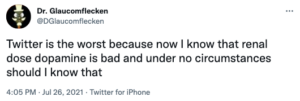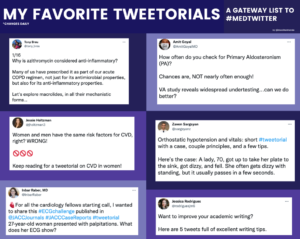April 5th, 2022
#MedTwitter: The Good, the Bad, and the Surprisingly Useful
Madiha Khan, DO
“Does this look professional enough for Twitter?”
My co-resident holds up her phone to show me her newly minted Twitter profile. A picture of a distant, shadowy figure in sand, framed by a circular thumbnail, is her profile picture. Underneath this vague portrait is what could only be presumed to be her twitter handle: her initials followed by a series of 6 or 7 numbers.
“This… looks like a bot’s profile.”
Despite having a decade-long dalliance with Twitter, I was reluctant to join the MedTwitter space, which (to a Redditor like me) sounded akin to a stunted faux-LinkedIn profile. However, about 2 years ago when I started my foray into digital education, my mentors in this realm over at CardioNerds seemed to view it as a necessary medium in the quest for creating decentralized, open-access medical education. So, I dusted off my decade-old account, deleted my tweets to AT&T regarding their customer service, and set sail. Fast forward to today, and I truly believe it is an invaluable resource. After revamping our residency twitter page, successfully convincing unwilling residents to join, and even ghost-writing a few bios, I wanted to share some insights on the benefits and pitfalls of being a part of the platform.
Why Should You Join?
By and large, the greatest return on investment is for those seeking residency or fellowship positions. I get it — in a time where trainees are expected to be productive researchers, effective educators, and excellent clinicians, it seems unjust to ask us to be our own brand ambassadors, too. But the truth is, more and more national organizations and programmatic leadership are seeking out the social diplomats of our time to usher us into this inevitable digital era.
The rise of social media ambassadors for conferences, for spotlighting and disseminating research, and for frequent posting of open positions are a testament to the fact that being able to navigate this space is viewed as a necessary skill. With the world available at the push of your fingertip, networking possibilities are infinite, even without flagrant self-promotion. Speculating further, from a program’s point of view, it doesn’t hurt to be a familiar face in a stack of endless applications. However, in my experience, this is probably not as much of an advantage as is being perceived as a conscientious ‘professional’ social media user.
Perhaps the most valuable aspect (and the primary reason I remain on the platform) is the medical education content. The latest research, journal clubs, “Tweetorials” on various topics, and the resultant discussion from experts in the field is the true value of this community. I was surprised to see not only the vast number of leaders in medicine, but also how active they were in sharing their knowledge and experience (which may underscore the need to have a presence on social media even for those well established in their field). What once was privileged access to information and people is now open; there is no more gatekeeping. The leaders of medicine, and of our world, are just 280 or fewer characters away.
There are some very effective teachers too; I find myself referring to certain Tweetorials by faculty across the country just because they explained how to approach a diagnostic dilemma so well in 5 to 10 tweets. The opportunity to have a virtual seat in other program’s teaching rounds — without having to watch an hour-long YouTube video — is pretty surreal.
And of course, another reason to join is to follow everyone’s favorite ophthalmologist, Dr. Glaucomflecken:
Why You May Have Avoided MedTwitter…
The medical community on Twitter is a bubble. That’s what makes it so easy to use as a networking tool, especially within your specialty, but it is also what makes it a vulnerable space. Certain ideas and personas are over-amplified in the echo-chamber of Medtwitter, and the space is particularly prone to groupthink. In a place where people are eager to break through, honest opinions that are not considered part of the mainstream are suppressed and, at worst, posters are sometimes “canceled” entirely. Unfortunately, this leads to behaviors like humble-bragging, self-aggrandizing, and virtue signaling, which are as easy to identify as they are off putting. Not to mention, just because someone is famous on MedTwitter doesn’t always mean they are as approachable and supportive to their colleagues in real life. The differing realities can make the community feel disingenuous.
Furthermore, sometimes a post may get some unwanted attention from someone outside of the community. An innocent picture of a group of residents getting the vaccine may diverge from the usual algorithm and show up in the wrong feed, and you end up with jarring comments from strangers calling you an agent of big pharma. It can be unnerving, especially for those who haven’t dealt with trolls before.
Personally, I try to avoid anything outside of the educational content of the bubble. I do this by being deliberate with which tweets I interact with and/or retweet to keep a semblance of control over ‘the algorithm.’ When it comes to the inevitable unwanted comments, I will impart age-old advice that was passed down generations of my family: Don’t Feed the Trolls.
Final Thoughts
Let’s face it, being a trainee on social media is complex. For the most part, medical students/residents/fellows potentially have the most to gain from being in the space with networking opportunities, digital education, and ability to keep apprised of advancements in their field in an efficient and interactive way. The key is to take it at your own pace. It doesn’t really matter if you want to interact peripherally with a de-identified account as a picture of sand or build an online presence, so long as you get value from it, and Don’t Feed the Trolls.
If you’re on the fence, here are some threads I keep coming back to (links included below):
- Why is azithromycin considered anti-inflammatory? By @Tony_Breu
- A practical approach to primary aldosteronism by @AmitGoyalMD
- CVD in Women by @JHoltzman3
- Tips for orthostatic hypotension by @sargsyanz
- Differentials for VT by @InbarRaber
- Academic writing tips by @rodriguesjm6
BONUS posts:
- Iron studies simplified by @sargsyanz
- Prophylaxis tips by @sargsyanz (and the NEJM article here)
- Really anything by @gradydoctor





Dear Dr. Khan,
I certainly hope that you share your absolutely superb sense of wry humor with your patients as a facet of your bedside manner! I thoroughly delighted in your commentary and more than just chuckled throughout the reading of it! I hope, hope, hope that you will engage we readers again in the near future! What a delight! Thank you!
Tamara Morgan, RN
Your comment made my day! Thank you so much for taking the time to read this and sending such kind words my way. Humor does make the medicine go down a bit easier 🙂